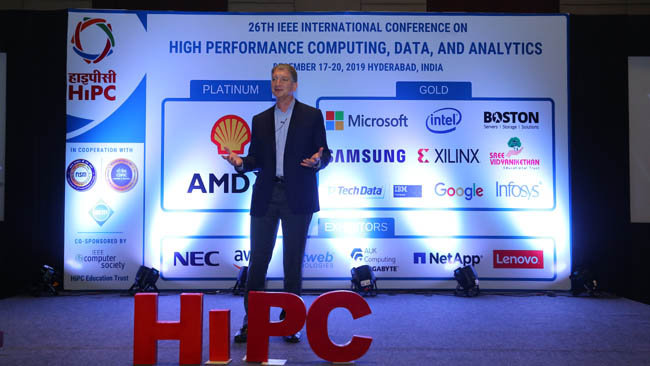
Hyderabad, 20 December, 2019: The Day 2 of the 26th IEEE International Conference on High-Performance Computing, Data and Analytics (HiPC) currently undergoing at the Hyderabad International Convention Centre (HICC) today deliberated on diagnosing the disease and treating through it the technology and the future of High-Performance Computing.
The day witnessed 2 keynote addresses by eminent experts. In the afternoon keynote, Mr. Mark Papermaster, Chief Technology Officer and Executive Vice President, AMD elaborated on the Future of High-Performance Computing. He explained that the demand for computing and graphics technologies is continuing to grow inexorably – from traditional HPC to emerging analytics, machine learning, and compute intensive visualization. He said that a new era of high-performance computing is upon us, however, it is increasingly clear that the techniques used until now will not deliver the same performance advances for the future. With an objective to sustain a Moore’s Law pace of performance improvements, the semiconductor industry is focusing on new areas of innovation. He also discussed on the new advances in system architecture, silicon design and software that will enable future generations of computing and graphics products to deliver more performance with greater efficiency.Dr. Ramesh Hariharan, CEO at Strand Life Sciences in his keynote address in the morning described the use of genome sequencing for diagnosing, treating genetic diseases and cancer also mention the computational problems that lie at the core of this effort.
Dr. Chiranjib Sur, Conference Chair, HiPC 2019 said “At HiPc 2019, we are aiming on deliberating on the upcoming trends in High Performance Computing and how the stakeholders can work together and utilize the value which HPC offers in a much more focussed manner. The quality sessions have been witnessing encouraging response from the delegates as they get the opportunity to learn about the potential of High Performance Computing.”
Along with the Keynote speeches, the delegates also attended Tech sessions on the topics of Accelerated Learning, Storage and Communication and a interactive session on “AI at scale” involving experts from industry and academia.